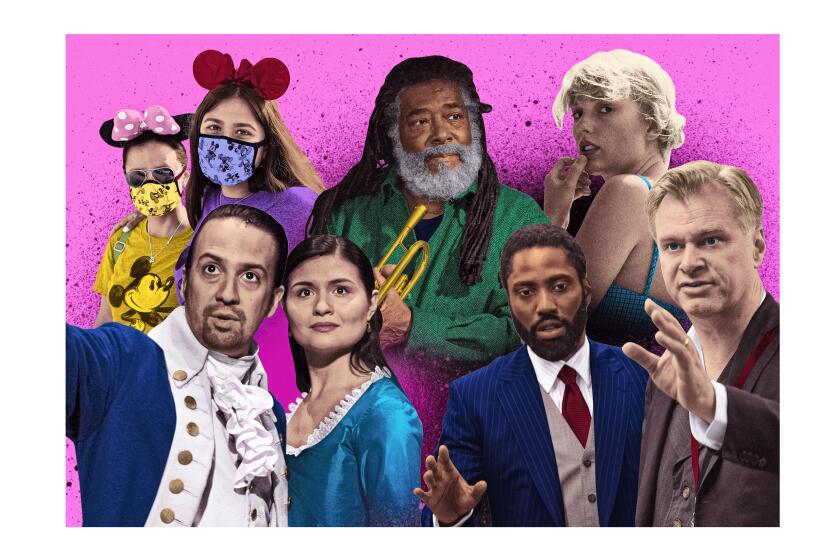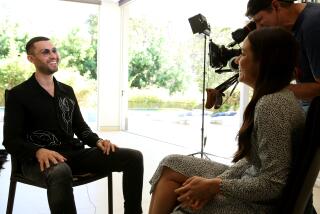‘We were canceled by the liberal media’: Inside the shutdown of pandemic party app Vybe Together
Just a few hours before New York City began winding down for its New Year’s Eve celebrations (hopefully) at home, Alexander Dimcevski was walking through the grocery store, wondering how he became 2020’s final COVID-19 villain.
“We were canceled by the liberal media,” Dimcevski said, a few days after news of his invite-only house-party-planning app Vybe Together sparked fresh fears that users were turning to clandestine social media apps to party indoors on New Year’s Eve, as the virus runs rampant through the U.S. “Apple took us down within hours. But we’re going to be back.”
As Los Angeles reels from its most severe wave of COVID-19 yet, with 10,000 deaths in L.A. County and a county resident now dying every 10 minutes from the disease, Vybe Together became the face of both tech-scene opportunism and nightlife recklessness when New York Times reporter Taylor Lorenz tweeted details about an early circulating version.
“We didn’t have a voice, we didn’t have a channel to express our side of the story,” said Dimcevski. “Within hours,” he claimed, “articles had headlines that were not true.”
Daniel Dumile, the acclaimed indie rapper and producer best known as MF Doom, died on Oct. 31, according to an Instagram post today from his wife.
Vybe Together, in its brief life available to NYC and Miami residents, joined a coterie of ticketing sites like Eventbrite and social media platforms that, wittingly or not, have facilitated the kinds of influencer mansion parties, hip-hop shows and raves that city officials believe contributed to the latest deadly surge. Vybe Together was built before COVID-19 but, more than most others, wore its outlaw intention openly as the disease surged.
As of Friday, just before New Year’s Eve, the app — which allowed users to host and market gatherings to chosen applicants and framed indoor private parties as a way to “get your rebel on” — was no longer available on any major app platform, and TikTok canceled its account.
Before the Vybe Together site was updated with a brief mea culpa (“Our intentions are for people to enjoy small gatherings in their apartments NOT illegal parties”), it had a “What about COVID” section explaining its approach to the pandemic: “We are aware that Covid is a major health problem to the country, our communities, our friends and family. ... Having large scale parties is very dangerous. That is why we don’t support that. But Vybe is a compromise, no big parties but small gatherings. We could be living, at least a little during these times with Vybe.”
While no more than a few thousand users ever successfully downloaded the app, and its founder claimed that those users arranged “no more than two or three” events per week, it quickly achieved any notoriety its elusive owners had set out for.
“I admit, we branded it poorly,” Dimcevski said, when asked if he understood why, as overwhelmed hospitals house patients in gift shops and run out of oxygen and supplies, people were outraged about the app’s premise. “We didn’t allow a lot of people to be part of this. We understand now is not the right time to go mainstream.”
Even though Dimcevski’s company got the app-store guillotine for its obvious public health threat, he didn’t think he was the worst offender out there.
“If people want to throw illegal parties, they go to Eventbrite because you can be anonymous,” he said. (Eventbrite had been the preferred local ticketing platform for parties ranging from rap shows to orgies during L.A.’s COVID-19 shutdown.) “There was nothing illegal with our app, it was only for small gatherings in apartments. They can be anything from board games to twerking with girls next door.”
The Beverly Hills restaurant La Scala tested the waters of throwing a clandestine indoor NYE party; a roving infamous L.A. party series called Spanky’s had similar plans. A Christian singer-songwriter, Sean Feucht, drew dozens of counterprotesters as he led his maskless fans in a potential superspreader sing-along through vulnerable homeless camps in Skid Row and Echo Park.
The city’s new rules state, “All public and private gatherings and events with people from more than one household are not permitted except for outdoor faith-based services and outdoor political expression.”
2020 decimated our cultural and entertainment institutions. Artists have readjusted their ways of working. Many wonder if they can continue their craft even after the pandemic. Yet we’ve also seen resilience and creativity.
But many locals and city officials fear that apps like Vybe Together are driving house party culture even deeper underground on big nights like New Year’s Eve. L.A. County Supervisor Hilda Solis told The Times, “From what we saw with so many people who attended gatherings and travels, we remain very concerned about another surge on top of the current surge.” Mayor Eric Garcetti wrote in a tweet: “Los Angeles, my message could not be clearer: Do not get together with those outside your household today. Do not host or attend a party in person. Do not travel. Please celebrate virtually and welcome the New Year with the people in your household. Stay safe, save lives.”
Dimcevski (a since-deleted LinkedIn listed him as a New York University graduate and native of Sweden) seemed torn between enjoying the newfound global attention and backpedaling on his app’s sudden reputation. He wouldn’t give further information about himself or Vybe Together, other than the app was based in New York and that, perhaps surprisingly, he said he received funding two years ago from a New York state tech grant program. “That’s the crazy part, because they gave us some money,” he said. “But no one’s been in touch yet.”
The app, he said, was never operational in L.A., the global heart of influencer culture. The parties Vybe Together facilitated would have violated public health orders here if it had been. But Dimcevski said that, as soon as Vybe Together gets out of app-store jail, he wants to eventually try again — the site asks fans to stay in touch for its planned return.
“We’d never condone illegal parties. Big underground raves, no, no, no,” Dimcevski said. “It was only for the coolest people in the city. We were using the app process to find out if you had the sauce.”
More to Read
The biggest entertainment stories
Get our big stories about Hollywood, film, television, music, arts, culture and more right in your inbox as soon as they publish.
You may occasionally receive promotional content from the Los Angeles Times.













